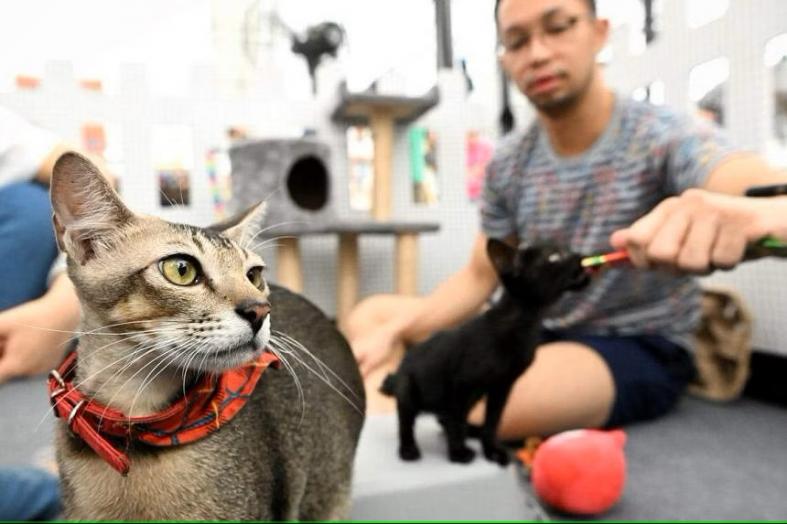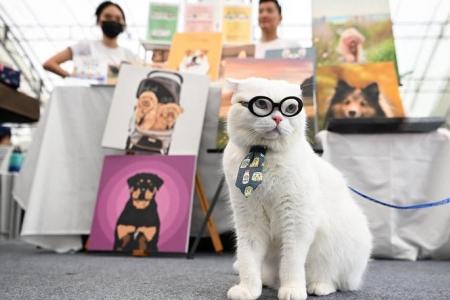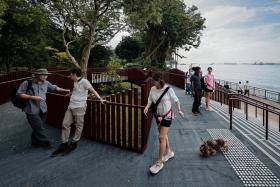HDB residents could soon own up to 2 cats per flat as Govt proposes lifting 34-year ban
People living in Housing Board flats will soon be allowed to keep cats, with a proposal by the Government to lift a ban of more than 30 years on cat ownership in public flats in the works.
Two cats will be allowed for each HDB flat, and three cats for each private residence, under a proposed framework on cat management announced by Senior Minister of State for National Development Tan Kiat How on Dec 2.
Pet cats will also need to be microchipped and licensed, among a slew of measures proposed to improve the management and welfare of pet and community cats.
The proposed changes will be available for further input for two months before they are implemented in the later part of 2024, he said at the Pets’ Day Out event held at Bishan-Ang Mo Kio Park.
A transition period of two years will be given to allow cat owners time to meet licensing conditions. During this period, cat owners can get their licences for free.
When the changes take effect, it will be illegal not to license pet cats, and owners will be subject to penalties similar to those under regulations for dog owners.
Dog owners can be fined up to $5,000 for not complying with licensing conditions.
The limit of two cats per household takes into consideration views of cat owners and non-cat owners, and aims to maintain a harmonious living environment for all, said Mr Tan.
HDB residents have not been permitted to own pet cats since 1989, and offenders may be fined up to $4,000 if found to have a pet cat in their flat under the Housing and Development (Animals) Rules. But actions are typically taken against flat owners only if there are complaints of their cats causing a nuisance.
The authorities recognise that some households may currently have more pet cats than the proposed limits, said Mr Tan. As such, during the transition period, cat owners can apply to license and keep all of their existing cats.
However, this will be subject to approval by the Animal and Veterinary Service (AVS), a cluster of the National Parks Board, which may conduct checks, he added.
Pet cats will need to be microchipped for a licence. This will ensure they are traceable, and cat owners can be held to greater account if their cats are found to be abandoned, neglected or abused, said Mr Tan.
Cat owners will need to ensure that the animals are kept in a safe environment, taking precautions such as installing window grilles or mesh to prevent cats from roaming or falling from height.
Mr Tan said the Society for the Prevention of Cruelty to Animals receives at least five reports of cats falling from height every week, and most do not survive.
Other licensing conditions include requiring cat owners to ensure the animals are kept under control in public, such as by using a harness, and requiring first-time cat owners to complete an online course on responsible pet ownership before they can be issued a licence.
As part of the proposed framework, pet cats belonging to low-income households, such as those living in public rental housing, can also get free sterilisation and microchipping from 2024. This follows a successful pilot Pet Cat Sterilisation Day that AVS held in November, when more than 80 pet cats belonging to low-income households were sterilised and microchipped, said Mr Tan.
The aim is to stem the unintended breeding of pet cats belonging to those unable to afford sterilisation, said AVS. Sterilisation also has health and behavioural benefits, as it reduces the risk of some cancers, and sterilised cats are less prone to roaming and caterwauling. Their urine also does not smell as pungent, said Cat Welfare Society president Thenuga Vijakumar.
To encourage the sterilisation of pet cats, licensed owners who have not sterilised their animals will be required to renew their licence regularly and at a higher fee.
Another proposed change is extending the Trap-Neuter-Rehome/Release-Manage programme for free-roaming dogs to community cats.
“This will allow us to better manage our community cat population holistically and in a humane and science-based manner, as we have done for our free-roaming dogs,” said Mr Tan.
Ms Thenuga welcomes the legalisation of cat ownership and mandatory licensing. She said an important question is what conditions are needed for cat owners to get a licence.
The public should weigh in on these conditions, which should ensure cat owners are responsible, she said.

Ms Thenuga also advocated the mandatory sterilisation of pet cats or significantly higher licensing fees for cat owners who do not sterilise their pets. The Cat Welfare Society sterilises more than 4,000 cats for free every year.
She noted that surveys done by the society showed that most cat owners have three or fewer cats, and so a cap of three cats in each flat might be more appropriate.
Cat owner Nur Faezah Mat Aris, 42, said the move to have them microchipped and licensed can help to reunite cats with their owners if the animals go missing. The executive, who owns three cats, is ambivalent about the cap of two cats per flat.
“I would think that is very subjective, because it doesn’t mean if you have two cats, you are a good pet owner (or) that if you have six cats, you cannot manage. I really hope that in time to come, with more experience, this may be reviewed as well,” she said.
The public can provide feedback on the proposed framework at https://go.gov.sg/cat-framework from now till Feb 1, 2024.
Get The New Paper on your phone with the free TNP app. Download from the Apple App Store or Google Play Store now


